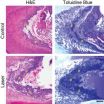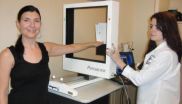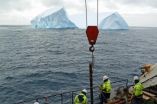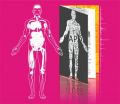(Press-News.org) PITTSBURGH—Keeping your friends close and your enemies closer may not be the best advice if you are 50 or older.
New research from Carnegie Mellon University's Rodlescia Sneed and Sheldon Cohen shows that unpleasant or demanding interpersonal encounters increase hypertension risk among older adults.
Published in the American Psychological Association's journal Health Psychology, the study provides some of the first concrete evidence that negative social interactions not only influence psychological well-being but also physical health – in this case, blood pressure levels. Hypertension affects an estimated 65 million Americans and is a major contributor to cardiovascular disease, the leading cause of death in the U.S.
"This demonstrates how important social networks are as we age - constructing strong, positive relationships are beneficial to prolonged health," said Cohen, the Robert E. Doherty University Professor of Psychology in the Dietrich College of Humanities and Social Sciences.
For the study, Sneed and Cohen used data from the Health and Retirement Study, a multi-year survey of 1,502 healthy adults aged 50 and over. In 2006, the frequency of negative interactions – exchanges or behaviors that involved excessive demands, criticism, disappointment or other unpleasantness – with their partners, children, other family members and friends was assessed by questionnaire. Blood pressure was measured at this assessment as well as four years later.
The results show that each increase in the total average negative social interaction score was associated with a 38 percent increased chance of developing hypertension over the four-year period. Younger older adults – those aged 51-64 – were also more affected than those 65 or older.
The researchers also observed sex differences in their findings. While negative interactions predicted hypertension risk among women, these interactions were not related to hypertension risk among men.
"There is a body of evidence in social psychology research suggesting that women care more about and pay more attention to the quality of their relationships," said Sneed, a Ph.D. candidate in psychology. "Our findings suggest that women are particularly sensitive to negative interactions, which is consistent with this previous work."
The researchers also found that the type of relationship matters. Negative interactions between friends and family led to an increase in hypertension risk while poor encounters with partners and children did not make a difference.
"Interpersonal conflicts are the most commonly reported stressor, so understanding their impact on health and well-being is particularly important," said Sneed.
INFORMATION:
This research was partially supported by the National Institute of Health's National Center for Complementary and Alternative Medicine.
For more information, visit http://www.psy.cmu.edu/~scohen/.
Negative social interactions increase hypertension risk in older adults
Women more affected by negative social interactions than men
2014-05-28
ELSE PRESS RELEASES FROM THIS DATE:
T cell repertoire changes predictive of anti-CTLA-4 cancer immunotherapy outcome revealed
2014-05-28
Sequenta, Inc. today announced publication of a study done in collaboration with researchers from UCSF and UCLA that used the company's proprietary LymphoSIGHT™ immune repertoire sequencing platform to investigate the effects of anti-CTLA-4 antibody on the number and types of T cells present in a patient's blood. The results, which appear in the May 28 issue of Science Translational Medicine, shed light on the mechanism of action of this type of cancer immunotherapy and suggest that immune repertoire sequencing could be used to predict which patients will have improved ...
Study: Amphetamines can delay exhaustion during exercise in the heat -- at a cost
2014-05-28
Indiana University researchers put male rats to the test to determine the role amphetamines play when used in conjunction with exercise.
When people or animals exercise in the heat, exhaustion is a safety gauge telling the body it is time to stop. Exhaustion occurs when the body's core temperature reaches a potentially dangerous point. The use of amphetamines is banned in many sports because they increase time to exhaustion.
What they found: Amphetamines can delay exhaustion during exercise in the heat by increasing the temperature at which it occurs. This potentially ...
Researchers use light to coax stem cells to repair teeth
2014-05-28
A Harvard-led team is the first to demonstrate the ability to use low-power light to trigger stem cells inside the body to regenerate tissue, an advance they reported in Science Translational Medicine. The research, led by Wyss Institute Core Faculty member David Mooney, Ph.D., lays the foundation for a host of clinical applications in restorative dentistry and regenerative medicine more broadly, such as wound healing, bone regeneration, and more.
The team used a low-power laser to trigger human dental stem cells to form dentin, the hard tissue that is similar to bone ...
EARTH magazine: The history, science and poetry of New England's stone walls
2014-05-28
Alexandria, Va. — When author John-Manuel Andriote returned to his hometown in New England after years away, he noticed something that had been invisible to him while growing up there — the old stone walls tumbling off into the forests. The realization that the crumbling and overgrown walls meant those forests had once been cleared farm lands set Andriote on a years-long journey of discovery that highlights the intersections of geologic and human history.
The story of New England's stone walls begins with the glaciers of the last ice age, meanders through the Colonial ...
Some high blood pressure drugs may be associated with increased risk of vision-threatening disease
2014-05-28
SAN FRANCISCO – May 28, 2014 – There may be a connection between taking vasodilators and developing early-stage age-related macular degeneration (AMD), the leading cause of vision loss and blindness among Americans who are age 65 and older, according to a study published online in Ophthalmology, the journal of the American Academy of Ophthalmology.
AMD – the deterioration of the eye's macula, which is responsible for the ability to see fine details clearly – affects an estimated 11 million people in the United States. In addition to increased age, the cause of AMD ...
NYU researchers pilot educational and behavioral program to reduce lymphedema risk
2014-05-28
Viewed as one of the most unfortunate outcomes of breast cancer treatment, lymphedema is characterized by an accumulation of lymph fluid in the interstitial spaces of the affected limb, leading to chronic ipsilateral limb swelling causing psychosocial distress and physical challenges for patients.
Even conservative estimates suggest that 3% of women who have had sentinel lymph node biopsy and 20% of those who have had axillary lymph node dissection may develop lymphedema a year after breast cancer surgery. Two established risk factors for lymphedema are compromised ...
A cure for dry eye could be a blink away
2014-05-28
A treatment for dry eye—a burning, gritty condition that can impair vision and damage the cornea—could some day result from computer simulations that map the way tears move across the surface of the eye.
Kara Maki, assistant professor in Rochester Institute of Technology's School of Mathematical Sciences, contributed to a recent National Science Foundation study seeking to understand the basic motion of tear film traversing the eye. "Tear Film Dynamic with Evaporation, Wetting and Time Dependent Flux boundary Condition on an Eye-shaped Domain," published in the journal ...
Antarctic ice-sheet less stable than previously assumed
2014-05-28
The first evidence for massive and abrupt iceberg calving in Antarctica, dating back 19,000 to 9,000 years ago, has now been documented by an international team of geologists and climate scientists. Their findings are based on analysis of new, long deep sea sediment cores extracted from the region between the Falkland Islands and the Antarctic Peninsula. The study in the May 28, 2014 issue of Nature bears witness to an unstable Antarctic ice sheet that can abruptly reorganize Southern Hemisphere climate and cause rapid global sea level rise.
"One of the iceberg events ...
Filling in the gaps on the protein map
2014-05-28
By cataloging over 18,000 proteins, researchers from TUM have produced an almost complete inventory of the human proteome. This information is now freely available in the ProteomicsDB database, which is a joint development of TUM and software company SAP. The database includes information for example on the types, distribution, and abundance of proteins in various cells and tissues as well as in body fluids.
The investigations show that, on the one hand, around 10,000 proteins are concerned with housekeeping processes in many different places. On the other hand, it was ...
Zeroing in on the proton's magnetic moment
2014-05-28
As part of a series of experiments designed to resolve one of the deepest mysteries of physics today, researchers from RIKEN, in collaboration with the University of Mainz, GSI Darmstadt and the Max Planck Institute for Physics at Heidelberg, have made the most precise ever direct measurement of the magnetic moment of a proton.
The work, published in Nature today, seeks to answer the fundamental question of why we exist at all. It is believed that the Big Bang some 13 billion years ago generated equal amounts of matter and antimatter-which annihilate when they collide-and ...
LAST 30 PRESS RELEASES:
DGIST identifies “magic blueprint” for converting carbon dioxide into resources through atom-level catalyst design
COVID-19 vaccination during pregnancy may help prevent preeclampsia
Menopausal hormone therapy not linked to increased risk of death
Chronic shortage of family doctors in England, reveals BMJ analysis
Booster jabs reduce the risks of COVID-19 deaths, study finds
Screening increases survival rate for stage IV breast cancer by 60%
ACC announces inaugural fellow for the Thad and Gerry Waites Rural Cardiovascular Research Fellowship
University of Oklahoma researchers develop durable hybrid materials for faster radiation detection
Medicaid disenrollment spikes at age 19, study finds
Turning agricultural waste into advanced materials: Review highlights how torrefaction could power a sustainable carbon future
New study warns emerging pollutants in livestock and aquaculture waste may threaten ecosystems and public health
Integrated rice–aquatic farming systems may hold the key to smarter nitrogen use and lower agricultural emissions
Hope for global banana farming in genetic discovery
Mirror image pheromones help beetles swipe right
Prenatal lead exposure related to worse cognitive function in adults
Research alert: Understanding substance use across the full spectrum of sexual identity
Pekingese, Shih Tzu and Staffordshire Bull Terrier among twelve dog breeds at risk of serious breathing condition
Selected dog breeds with most breathing trouble identified in new study
Interplay of class and gender may influence social judgments differently between cultures
Pollen counts can be predicted by machine learning models using meteorological data with more than 80% accuracy even a week ahead, for both grass and birch tree pollen, which could be key in effective
Rewriting our understanding of early hominin dispersal to Eurasia
Rising simultaneous wildfire risk compromises international firefighting efforts
Honey bee "dance floors" can be accurately located with a new method, mapping where in the hive forager bees perform waggle dances to signal the location of pollen and nectar for their nestmates
Exercise and nutritional drinks can reduce the need for care in dementia
Michelson Medical Research Foundation awards $750,000 to rising immunology leaders
SfN announces Early Career Policy Ambassadors Class of 2026
Spiritual practices strongly associated with reduced risk for hazardous alcohol and drug use
Novel vaccine protects against C. diff disease and recurrence
An “electrical” circadian clock balances growth between shoots and roots
Largest study of rare skin cancer in Mexican patients shows its more complex than previously thought
[Press-News.org] Negative social interactions increase hypertension risk in older adultsWomen more affected by negative social interactions than men



